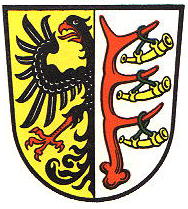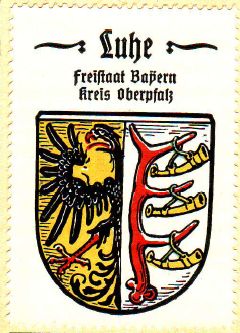Luhe: Difference between revisions
Knorrepoes (talk | contribs) m (Text replacement - "{{media}}" to " {{de1}} {{media1}}") |
Knorrepoes (talk | contribs) m (Text replacement - "{{de}}" to "") |
||
| Line 1: | Line 1: | ||
'''LUHE''' | '''LUHE''' | ||
Revision as of 19:49, 26 December 2022
LUHE
State : Bayern
District (Kreis) : Neustadt an der Waldnaab
Incorporated into : 1978 Luhe-Wildenau
| German |
Gespalten von Gold und Silber; vorne ein halber, rot bewehrter schwarzer Adler am Spalt; hinten eine aufrechte rote Hirschstange, an deren linksgewendeten Enden goldene Jagdhörner an grünen Fesseln hängen. |
| English | No blazon/translation known. Please click here to send your (heraldic !) blazon or translation |
Origin/meaning
According to legend, the arms were granted in 1331 by King Ludwig der Bayer, but there is no historical proof for that. The arms do appear, however, already on the oldest known seal of the city, dating from 1403. All later seals and images have shown the arms, only the colours have changed during the centuries. The present colours have been used since the 19th century. The eagle symbolises the fact that Luhe was an Imperial estate. The left half shows a deer antler with three horns, which most likely indicate the hunting rights of the Kings in the Loher Forst woods.
| The arms by Hupp in the Kaffee Hag albums +/- 1925 |
Literature: Stadler, 1964-1971, 8 volumes; Hupp, O: Kaffee Hag albums, 1920s

